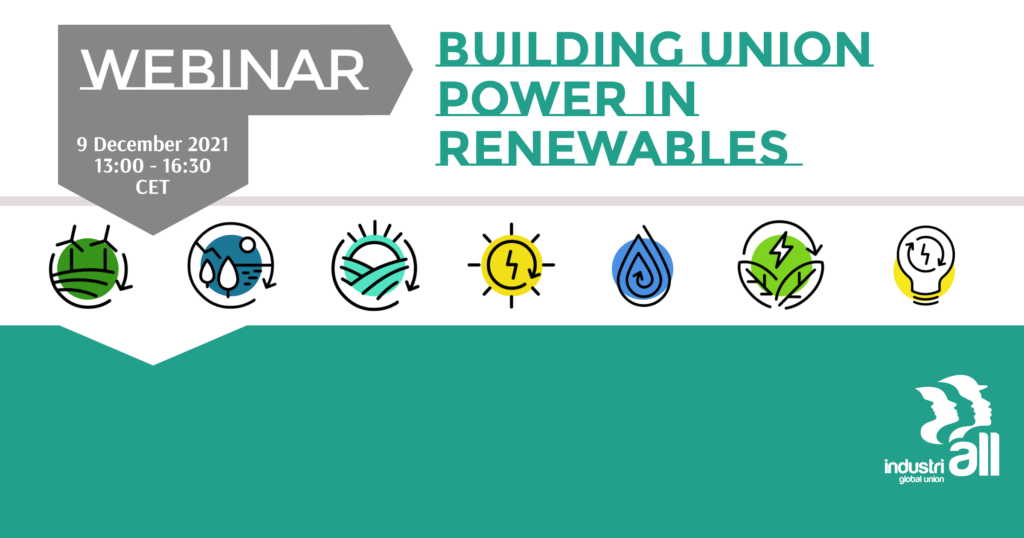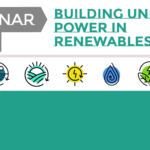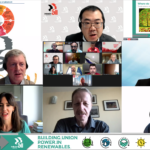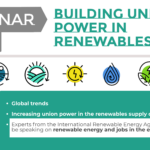10 December, 2021Millions of new jobs are being created in the renewable energy supply chain, in sectors represented by IndustriALL. How do unions make sure that these new jobs are good jobs?
This was the key question that emerged from IndustriALL Global Union’s webinar on Building union power in renewables,held on 9 December, with experts from the International Renewable Energy Agency (IRENA), an intergovernmental knowledge, policy and finance centre.
Ulrike Lehr and Michael Renner from IRENA gave a summary of what an energy transition pathway could mean in terms of the economy, employment, and human welfare.
IRENA’s research on Renewable Energy and Jobs shows that the global pandemic has not slowed down the growth of renewable energy, and highlights the tight connections between the environment, the economy and human well-being.
The growing challenges of climate change reinforce the need for a just and inclusive transition toward sustainable, decent, climate-friendly jobs. The transition is well under way: in 2020 the renewable energy sector employed over 12 million people, and IRENA’s projections show that this number will only increase with time.
Ulrike Lehr, presenting scenarios for the future, stressed that “renewable energy jobs will increase to 43 million by 2050. While this is reassuring, all stakeholders need to be onboard.”
Michael Renner explained:
“Technological advance influences employment creation in renewable energy, resulting in a reduction in costs. As renewable energy gets cheaper it becomes more competitive than fossil fuels, and employment increases. In parts of the value chain relating to the manufacture of equipment, and construction and installation, jobs will be created. As more and more capacity is installed over time, you will have more jobs in operations and maintenance.”
Just weeks after taking part in COP26, where trade unions made their demands clear, IndustriALL energy director Diana Junquera Curiel highlighted what these developments mean for unions.
“We need to support our affiliates throughout the supply chain. This can’t happen if we can’t ensure decent jobs, decent wages, labour rights and health and safety.
“We need a holistic approach that enables a more sophisticated understanding of not only the energy sector, but the economy, society and the planet" said Junquera.
“We are here to support workers in the changing world. Let us embrace the change towards green technologies and take the lead in training measures – thus we must make sure that the transition is a just one””, said Matthias Hartwich, IndustriALL director for mechanical engineering and base metals.
Hartwich explained how mechanical engineering can be part of the solution, through green technology, giving industries a chance to engineer a better future.
A country’s ability to create jobs in renewable energy depends on its economic structures and capabilities. What dependencies does a country have, in terms of commodities, technology, and geographic footprint, and to what extent are they actively trying to localize capacity for renewable energy? Advancement in each country depends on national policymaking.
Kan Matsuzaki, IndustriALL assistant general secretary, spoke about building union power in the renewable supply chain. He explained that while IndustriALL supports affiliates with global framework agreements, networks and policy research, a more strategic approach is needed to ensure that affiliates are actively engaged in the transformation ahead.
IRENA’s experts explained that there is a need to actively address skills training, labour market measures and gender policies . There is a lot of work to be done to overcome the barriers that women face in the renewables industry. Better networks, and mentorships to support women, are needed.
Atle Høie, IndustriALL general secretary, concluded:
“We have a huge task ahead of us. As we transition from fossil fuels towards renewable energy, the new jobs that will be created will be in sectors that we represent. We need to make sure they are good organized jobs.”



